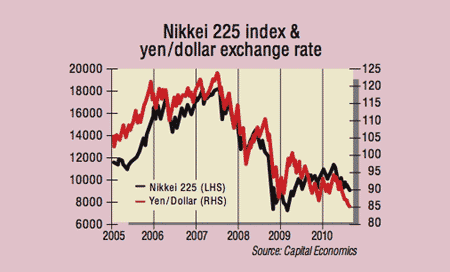
Currency traders may talk of the yen soaring to a new record against the dollar, but no one is getting excited about Japanese stocks. Indeed, the Nikkei 225 index has fallen even as the yen has strengthened. “It may be overdoing it to say that the strong yen has caused the stockmarket to weaken,” says John Higgins of Capital Economics. But there’s no doubt that the two have often moved together over the past five years.
Some analysts fear this is further evidence that a strong yen is not just out of line with fundamentals, but is actively damaging the Japanese economy. Exporters claim their competitiveness is being badly eroded by a currency that continues to get stronger regardless of conditions at home or around the world. “I want Tokyo to hear our wailing,” the chairman of car maker Suzuki told Bloomberg. The situation is “extremely grave” and threatens to have a “very big” impact on profits.
But where’s the evidence? asks Martin Hutchison on Breakingviews.”In July, exports were up 2% on the month and 23.5% from the previous year. Japan also continues to run a large current-account surplus.” Japan is still internationally competitive, agrees Capital Economics. While the headlines may claim that the yen is almost back to its highs set in 1994, after adjusting for different inflation rates at home and abroad, the real effective exchange rate of the yen is only slightly above its long-run average.
So if exporters are losing money, perhaps the yen is just a convenient scapegoat for other issues. The real problem may be that Japanese firms suffer from poor profitability at the best of times. So a relatively small shock can send them into the red. At the last peak in 2007, large firms’ average return on equity was 10%, says Naoki Kamiyama of Deutsche Bank. Margins at US and Europe peers were almost twice that. Too many Japanese firms have inefficient structures, weak pricing power and poor pricing strategies. In short, they are not focused on maximising returns to shareholders.
If Japanese firms want to get out of a crisis, maybe they should be fixing that, rather than squealing about the yen. On the plus side, there has been a “gradual but ongoing evolution” in corporate quality, says Kamiyama. But much more needs to be done.